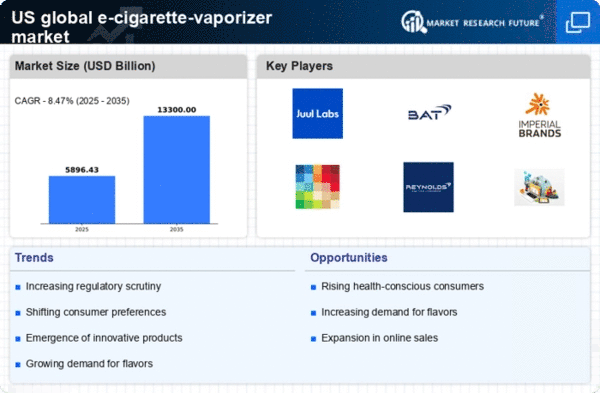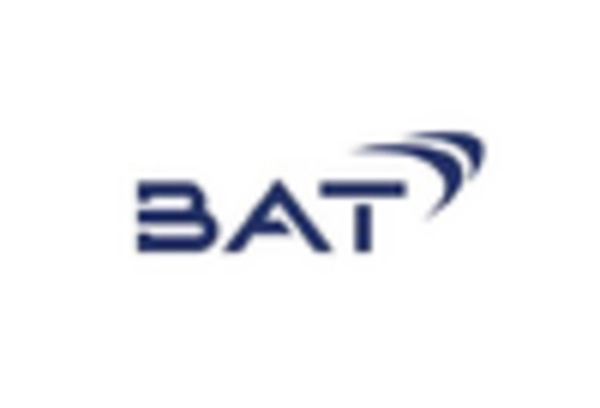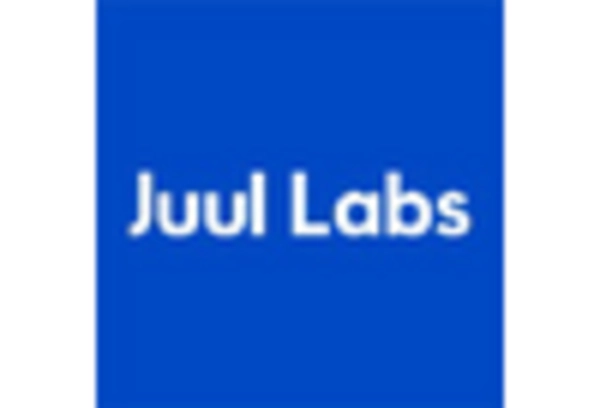Diverse Product Offerings
The global e-cigarette-vaporizer market is characterized by a wide array of product offerings, catering to various consumer preferences. Manufacturers are continuously innovating to introduce new flavors, designs, and functionalities, which enhances consumer engagement. For instance, the introduction of pod systems and disposable e-cigarettes has attracted a younger demographic, contributing to a projected growth rate of 15% annually. This diversification not only meets the demands of existing users but also attracts new customers, thereby expanding the market base. The variety in product offerings is crucial for maintaining competitiveness and relevance in the global e-cigarette-vaporizer market.
Health Consciousness Among Consumers
The increasing awareness of health issues related to traditional smoking has led to a growing preference for e-cigarettes and vaporizers. Consumers are increasingly seeking alternatives that are perceived as less harmful. This shift in consumer behavior is reflected in the global e-cigarette-vaporizer market, where sales have surged, with estimates indicating a market value of approximately $20 billion in 2025. The appeal of e-cigarettes as a smoking cessation tool further drives this trend, as many users view them as a means to reduce nicotine intake. Consequently, the health consciousness among consumers is a pivotal driver, influencing product development and marketing strategies within the global e-cigarette-vaporizer market.
Marketing and Advertising Strategies
Effective marketing and advertising strategies play a crucial role in shaping consumer perceptions and driving sales in the global e-cigarette-vaporizer market. Companies are leveraging digital platforms and social media to reach target audiences, particularly younger consumers who are more likely to engage with brands online. Innovative campaigns that highlight product benefits and lifestyle associations have proven effective in attracting new users. As a result, the market is witnessing a surge in brand loyalty and consumer engagement, which is essential for sustaining growth. The strategic focus on marketing is likely to continue influencing the dynamics of the global e-cigarette-vaporizer market.
Regulatory Environment and Compliance
The regulatory landscape surrounding e-cigarettes and vaporizers is continually evolving, impacting the global e-cigarette-vaporizer market. Stricter regulations regarding advertising, sales, and product safety are being implemented, which can pose challenges for manufacturers. However, compliance with these regulations can also serve as a competitive advantage, as companies that prioritize safety and transparency may gain consumer trust. The market is adapting to these changes, with many brands investing in compliance measures to ensure their products meet regulatory standards. This proactive approach is likely to shape the future of the global e-cigarette-vaporizer market, influencing both product development and marketing strategies.
Social Acceptance and Cultural Shifts
The evolving social landscape has contributed to the acceptance of e-cigarettes and vaporizers as mainstream products. As societal norms shift, the stigma associated with vaping diminishes, leading to increased usage among various demographics. This cultural shift is particularly evident among younger adults, who view vaping as a trendy alternative to traditional smoking. The global e-cigarette-vaporizer market benefits from this trend, as it encourages more individuals to explore vaping options. Market data suggests that approximately 30% of young adults in the US have tried vaping, indicating a significant potential for growth driven by social acceptance.

















